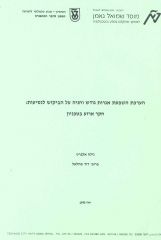This work deals with the influence of overflow and parking tolls on the demand for traveling to destinations, with regard to the behavioral aspect of the demand for travel and identifying the factors influencing the choice of travel means.
The need for demand management and external intervention in the transportation system by tolls was created because there were external flaws, i.e., market forces are unable to create an optimal equilibrium: demand for travel grows at a fast pace while the supply of the system is constant and limited. As a result traffic volume is greater than its optimal level, creating overflow conditions which constitute the main problem of the system: average travel speed decreases, travel time increases and traffic delays are created. Tolls are meant to bring about changes in the travel patterns of the user thereby reducing demand for travel in private cars and creating a new optimal equilibrium for the system, from an economic-social point of view, between supply and demand for travel.
In the framework of the project a case study was conducted to asses, in two hypothetical situations, the change that will occur in the travel habits of a sample of Technion employees who come to work at the Technion in their private cars:
The first situation describes charging an entrance toll (a sort of overflow toll) from every private vehicle entering the Technion during peak hours in the morning (between 7.30 to 8.30 a.m.).
The second situation describes collecting a parking toll on a daily basis from every private vehicle parking in Technion campus.
Today entrance to and parking in the Technion campus are not subject to any payment.












